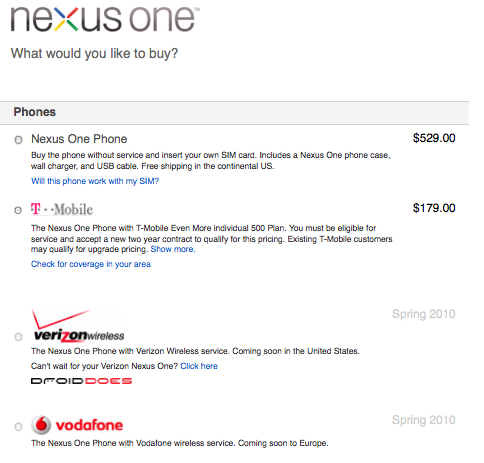 What Google unveiled this week was not just a device, the Nexus One, but a vision for the way phones should be bought and sold.
What Google unveiled this week was not just a device, the Nexus One, but a vision for the way phones should be bought and sold.
Andy Rubin, who became Google’s mobile chief after it acquired his startup Android, said he sees a future where people buy phones the way they purchase digital cameras. They’ll do it primarily online and use the web and word of mouth to research different models, instead of in a carrier’s store and with a two-year service contract.
The way phones have been sold in the past — with a subsidized device and that pesky contract — has partially been a prison of our own making. With price expectations anchored at $200 or less, consumers balked at paying the upfront cost of a high-end phone at between $400 and 600. Apple initially tried to woo people off that model when it launched the iPhone, but the company quickly reverted to the older pricing structure.
The problem with that model is that pure competition on service quality and pricing suffers when customers are trapped in two-year contracts. It incentivizes carriers to focus on getting exclusive hardware and spend hundreds of millions of dollars on brick-and-mortar stores and expensive marketing campaigns over improving the coverage and quality of the network. The U.S. has Byzantine pricing schemes compared to other countries. Americans pay twice for every call — a charge for the caller and the receiver and sensible pay-as-you-go models common in Europe and Asia are few and far between.
Google is taking another crack at trying to break the legacy pricing model, but with baby steps. You can either buy a phone unlocked or choose a subsidized price paired with a two-year contract from a mobile operator. As of this point, only T-Mobile is on board, with Verizon coming on in the spring. With the Nexus One, Google says its keeping its sales strategy “pure and simple.” As of now, there won’t be models in physical retail stores. You’ll have to look at it on-line or have the good fortune of having a friend who has one. Although for now Google’s online store will just have the Nexus One and presumably future Nexus models, a longer-term implication is that the company could sell other types of hardware, perhaps even Chrome OS netbooks, online.
All of these moves are far from what’s needed to reshape the way we buy phones. The concept of buying unlocked phones then choosing a carrier isn’t particularly novel. It’s just that a company with the brand weight and technical expertise Google carries hasn’t done it yet with multiple carriers in tow. For it to work, enough consumers would have to vote with their dollars in Google’s store to show that’s the way they want to buy phones. The other two major carriers, AT&T and Sprint-Nextel, might need to jump in with proper monthly pricing plans for the phone as well. Or more imaginatively, if the search giant really wanted to remake the system, it could buy cellular bandwidth and offer its own data network, with Google Voice obviating the need for any traditional calling plan. Or maybe we could dream that in the distant future, it could apply its Googly “free” model and offer an ad-supported phone.
We talked to several carriers to get their thoughts. T-Mobile’s subsidized Nexus One price is a $179, with a $79.99 monthly fee. Verizon hasn’t yet to disclose its pricing details, according to the carrier’s spokesman Jeffrey Nelson. If (for whatever reason) you want to be on AT&T’s network over Verizon’s, AT&T spokesman Rolf Gatlin says Nexus One owners can buy the unlocked phone, then purchase a data plan for $30 a month, plus their choice of voice plans based on the number of minutes per month. That data plan rate is month-to-month, not a contract rate.
It’s hard to break bad habits though. The old model persists — yesterday T-Mobile said it’s getting the HD2, an HTC Windows Mobile-based phone exclusively, while AT&T said that some devices in its new slate of Android-based phones will have some exclusivity as well.
VentureBeat's mission is to be a digital town square for technical decision-makers to gain knowledge about transformative enterprise technology and transact. Learn More
